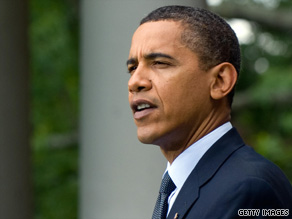
On the eve of his fourth prime-time news conference, President Obama was working the phones, calling lawmakers involved in the health care talks to push them to embrace reform, White House Communications Director Anita Dunn said Wednesday.
It follows the president’s Tuesday meeting with Democrats at the White House, dubbed a “serious working session” where “major progress” was made, Dunn said. Senior administration officials said the president will not meet with lawmakers Wednesday but was temporarily shifting focus to the discussions with visiting Iraqi Prime Minister Nuri al Maliki, the joint news conference with him, and then the prime-time news conference Wednesday. Obama was talking with his advisers and staff throughout the day regarding any updates from Capitol Hill on the state of the health care debate. Aides said the president’s opening statement at the news conference will be approximately seven minutes long. It will focus primarily on health care, but also will be a “report card” on the administration’s accomplishments during the first six months, and where the administration needs to go, aides said. The president was still tinkering with the speech at mid-afternoon, but aides said there were no “holes” in it as such, to put in news of any anticipated legislative “breakthroughs” from Congress. Officials said Obama will be taking a more hands-on approach with members of Congress in the days and weeks to come regarding the health care debate. Tuesday, House Energy and Commerce Chairman Rep. Henry Waxman of California and six other committee members met at the White House for more than two hours — and during one hour the president was with them, aides said. During that meeting the six so-called Blue Dog Democrats gave their list of 10 demands on how they want the bill changed, including ways to cut costs, according to aides. Watch more on health care negotiations » Some argued the Medicare advisory council, which advises Congress in setting rates for reimbursement to medical providers under the Medicare program, should be empowered to make changes in cost-related issues. White House aides said they want the panel to be empowered to make cuts in benefits and increases in premiums, and to force those changes, unless Congress rejects. While lawmakers say a tentative deal was reached on this point, White House officials would only say the president “agreed with the lawmakers he met with [on] the need to cut costs.” They refused to confirm there was a verbal agreement because there was “not an actual ink agreement” regarding the council. “The process is still going on,” one official said. White House Communications Director Dunn said the White House, through Peter Orszag, director of the Office of Management and Budget, has been lobbying for the idea of an independent board of medical professionals working to set and cut costs of health care. The president took his “direct concerns” to members of Congress and they did the same, Dunn said. “The president feels as if the Blue Dog Democrats and the Senate Finance Committee are ‘working together in a bipartisan way,’ ” Dunn said. White House aides say the administration is concerned about three centers of serious opposition from House Democrats: the fiscally conservative Blue Dog Democrats who are worried about the cost of a public health care plan; the freshmen and other Democrats from high-income districts who are concerned about taxes for high-income Democrats, and the anti-abortion Democrats who are concerned about federal funding going for abortion services, and whether health care providers can opt out of certain procedures.
One official said the administration is aware that “if any of these three groups abandon the effort the bill would be impossible to get out of committee, much less pass.” Aides say the president and lawmakers also discussed the public option versus a co-op option.